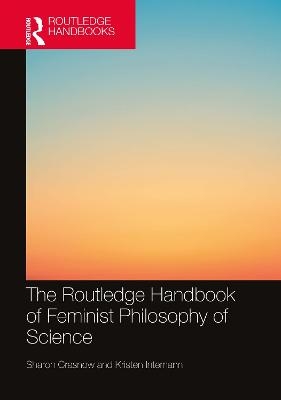
The Routledge Handbook of Feminist Philosophy of Science
Routledge (Verlag)
978-0-367-62131-5 (ISBN)
The Routledge Handbook of Feminist Philosophy of Science is a comprehensive resource for feminist thinking about and in the sciences. Its 33 chapters were written exclusively for this Handbook by a group of leading international philosophers as well as scholars in gender studies, women’s studies, psychology, economics, and political science.
The chapters of the Handbook are organized into four main parts:
I. Hidden Figures and Historical Critique
II. Theoretical Frameworks
III. Key Concepts and Issues
IV. Feminist Philosophy of Science in Practice.
The chapters in this extensive, fourth part examine the relevance of feminist philosophical thought for a range of scientific and professional disciplines, including biology and biomedical sciences; psychology, cognitive science, and neuroscience; the social sciences; physics; and public policy.
The Handbook gives a snapshot of the current state of feminist philosophy of science, allowing students and other newcomers to get up to speed quickly in the subfield and providing a handy reference for many different kinds of researchers.
Sharon Crasnow is a Distinguished Professor of Philosophy Emerita, Norco College in Norco, California, USA and Associate Researcher at the Centre for Humanities Engaging Science and Society (CHESS) at Durham University, UK. She co-edited Out from the Shadows: Analytical Feminist Contributions to Traditional Philosophy (2012). She currently co-edits the Lexington book series Feminist Strategies. Kristen Intemann is a Professor of Philosophy and the Director for the Center for Science, Technology, Ethics & Society at Montana State University, USA. Her recent book, co-authored with Inmaculada de Melo-Martin, is The Fight Against Doubt: How To Bridge the Gap Between Scientists and the Public (2018).
Introduction Part I: Hidden Figures and Historical Critique 1. The Origins of Philosophy and Science in Ancient Greece 2. Margaret Cavendish and the New Science 3. Emilie Du Châtelet 4. The Rocket Women of India: Eight Women Scientists and Their Roles in the 2014 Mars Orbiter Mission (MOM) 5. Women’s Contributions to the Philosophy of Science Part II: Frameworks 6. Feminist Empiricism 7. Thinking Outside-In 8. Latin American Decolonial Feminist Philosophy of Knowledge Production 9. Sciences of Consent 10. Queer Science Studies/Queer Science 11. Naturalizing and Denaturalizing Impairment and Disability in Philosophy and Feminist Philosophy of Science 12. Epistemic Vices and Feminist Philosophies of Science 13. "Where are all of the Pragmatist Feminist Philosophers of Science?" Part III. Key concepts and Issues 14. Is Sex Socially Constructed? 15. Feminist Perspectives on Values in Science 16. Situated Knowledge and Objectivity 17. Ignorance, Science, and Feminis 18. How the Facts Might Give Us Socially Responsible Science 19. Feminist Science for the People Part IV. Feminist Philosophy of Science in Practice 20. Feminist Philosophy of Biology 21. Observing Primates 22. The Gendered Nature of Reprogenetic Technologies 23. What’s Wrong with (Narrow) Evolutionary Psychology 24. Neurosexism and Our Understanding of Sex Differences in the Brain 25. Feminism and Cognitive Neuroscience 26. Implementing Intersectionality in Psychology with Quantitative Methods 27. Feminist Economics 28. Feminist Methodology in the Social Sciences 29. Feminist Approaches to Concepts and Conceptualization: Towards Better Science and Policy 30. What is it like to be a woman in philosophy of physics? 31. Inclusivity in Engineering Education 32. Rethinking Debates About Pediatric Vaccine Safety 33. The Hard Sell of Genetically Engineered (GE) Mosquitoes with Gene Drives as the Solution to Malaria
| Erscheinungsdatum | 13.07.2022 |
|---|---|
| Reihe/Serie | Routledge Handbooks in Philosophy |
| Verlagsort | London |
| Sprache | englisch |
| Maße | 178 x 254 mm |
| Gewicht | 843 g |
| Themenwelt | Geisteswissenschaften ► Philosophie ► Erkenntnistheorie / Wissenschaftstheorie |
| Geisteswissenschaften ► Philosophie ► Ethik | |
| Naturwissenschaften ► Biologie | |
| ISBN-10 | 0-367-62131-2 / 0367621312 |
| ISBN-13 | 978-0-367-62131-5 / 9780367621315 |
| Zustand | Neuware |
| Haben Sie eine Frage zum Produkt? |
aus dem Bereich


